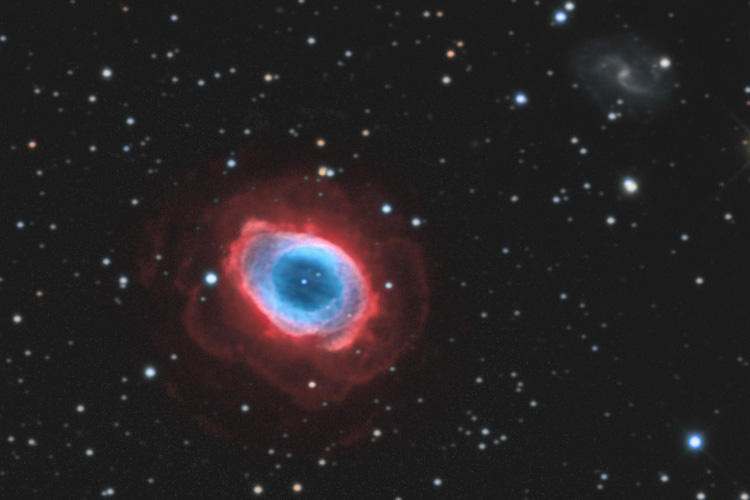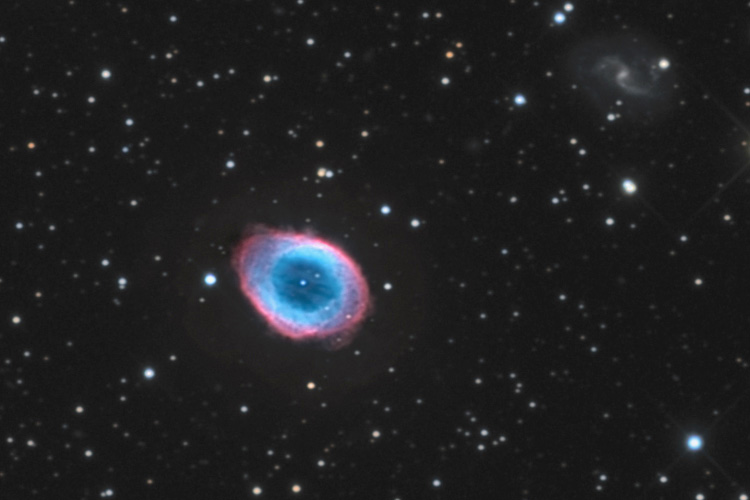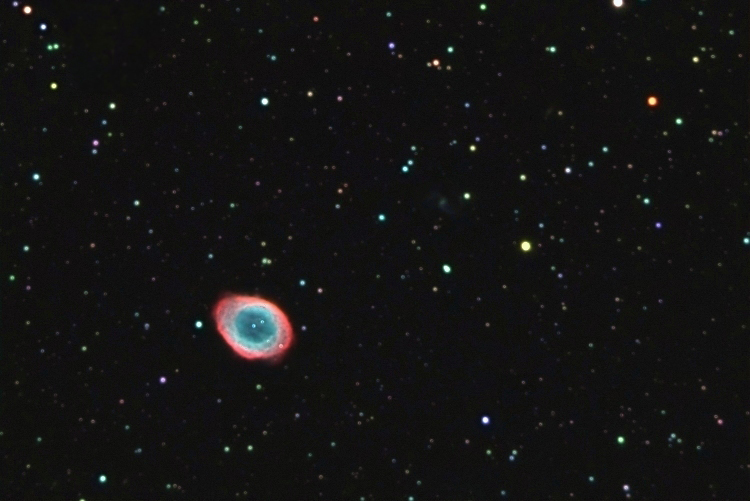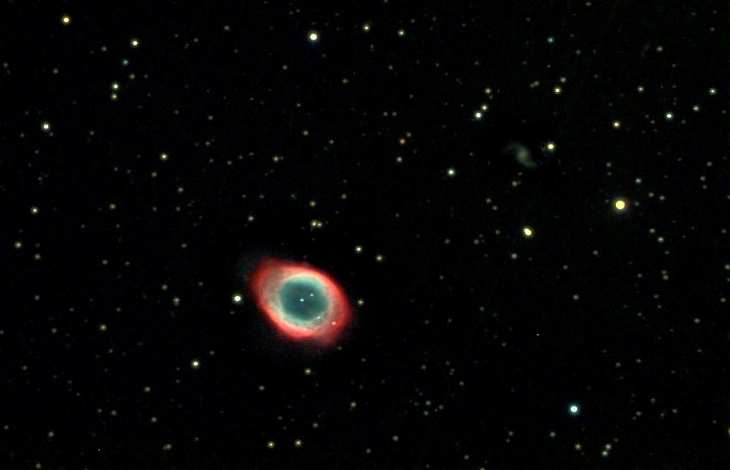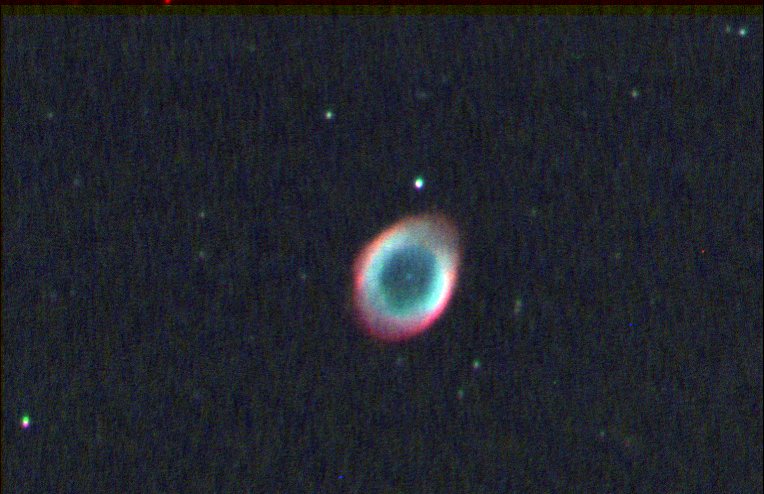|
Home
Recent Images
Galaxies
Nebulae
Natural Color
Narrow Band
H-Alpha
Clusters
Comets
Solar System
Observatory
Equipment
My Freeware
Tips & Tricks
Published Images
Local Weather
Terrestrial
Send Email
\
|
M57 The Ring Nebula
Click the image for a wide
field display (1800 x 1200)
|
Instrument |
12.5" RCOS @
~f/9 (2880 mm fl) 0.643 arcsec / pixel. |
|
Mount |
Paramount ME |
|
Camera |
SBIG STL-11000 w/
internal filter wheel, AstroDon Filters |
|
Acquisition Date |
5/15/2009 to 7/3/2009
Chino Valley, AZ |
|
Exposure |
Lum
240 min ( 8 x 30 min, bin 1x1)
RGB
360 min ( 4 x 30 min each, bin 1x1)
Ha
540 min (18 x 30 min each bin 1x1 ) |
|
Software |
CCDSoft, CCDStack, Photoshop CS w/ the Fits Liberator plugin and
Noel
Carboni's actions.
CCDStack to register,
normalize, data reject, combine sub exposures, pixel math and RGB
combine. eXcalibrator (pre-beta) for color calibration.
PhotoShop for
luminance processing and LRGB combine. |
|
Comment |
North is to the
top.
Except for the
rings of Saturn, the Ring Nebula (M57) is probably the most famous
celestial band. This planetary nebula's simple, graceful appearance
is thought to be due to perspective -- our view from planet Earth
looking straight into what is actually a barrel-shaped cloud of gas
shrugged off by a dying central star.
The Ring Nebula is about one
light-year across and 2,000 light-years away in the northern
constellation Lyra.
|
|
|
|
Click the image for a wide
field display (1800 x 1200)
|
Instrument |
12.5" RCOS @
~f/9 (2880 mm fl) 0.643 arcsec / pixel. |
|
Mount |
Paramount ME |
|
Camera |
SBIG STL-11000 w/
internal filter wheel, AstroDon Filters |
|
Acquisition Date |
6/23/2009 to 7/3/2009
Chino Valley, AZ |
|
Exposure |
Lum
240 min ( 8 x 30 min, bin 1x1)
RGB
360 min ( 4 x 30 min each, bin 1x1) |
|
Software |
CCDSoft, CCDStack, Photoshop CS w/ the Fits Liberator plugin and
Noel
Carboni's actions.
CCDStack to register,
normalize, data reject, combine sub exposures, pixel math and RGB
combine. eXcalibrator (pre-beta) for color calibration.
PhotoShop for
luminance processing and LRGB combine. |
|
Comment |
North is to the
top.
|
══════════════════════════════════
|
Instrument |
Celestron C11 @ F/6.1
(1705 mm) 1.087 arcsec / pixel |
|
Mount |
Losmandy G11 |
|
Camera |
SBIG ST-7 with
CFW-8A color wheel |
|
Acquisition Date |
8/15/05 & 8/17/05
Near downtown Seattle |
|
Exposure |
Lum 180 min
(12 X 15 min)
Red 80 min (8 x 10, bin 2 x 2)
Green 50 min (5 x 10, bin 2 x 2)
Blue 45 min (3 x 15, bin 2 x 2) |
|
Software |
CCDSoft, FocusMax,
CCDOPS, Sigma Clip (pre beta 11) and PhotoShop CS. The DitherMat was used to dither the luminance
layer. |
|
Comment |
North is to the
top.
|
══════════════════════════════════
|
Instrument |
Celestron C11 @ F/7.2
(2000 mm) 0.93 arcsec / pixel |
|
Mount |
Losmandy G11 |
|
Camera |
SBIG ST-7 with
CFW-8A color wheel |
|
Acquisition Date |
7/24/04 to 9/30/04
Near downtown Seattle |
|
Exposure |
Lum 82.5 min
(11 X 7.5 min)
Red 15 min (15 x 1, bin 2 x 2)
Green 13 min (13 x 1, bin 2 x 2)
Blue 14 min (14 x 1, bin 2 x 2) |
|
Software |
CCDSoft, Paint
Shop Pro |
|
Comment |
North is to the top. |
══════════════════════════════════
First Ever
Deep Space Image
|
Instrument |
Celestron C11 @
F/10 (2800 mm) 0.66 arcsec / pixel |
|
Mount |
Losmandy G11 |
|
Camera |
SBIG ST-7 with
CFW-8A color wheel |
|
Acquisition Date |
9/20/2003
Near downtown Seattle |
|
Exposure |
Red 5 min (10 x
30 sec. bin 1 x 1)
Green 5 min (10 x 30 sec. bin 1 x 1)
Blue 5 min (10 x 30 sec. bin
1 x 1)
Acquired with CCDOPS
using "track and accumulate" |
|
Software |
CCDSoft for color
combine and Paint Shop Pro for JPEG conversion. |
|
Comment |
North is to the right. |
|

